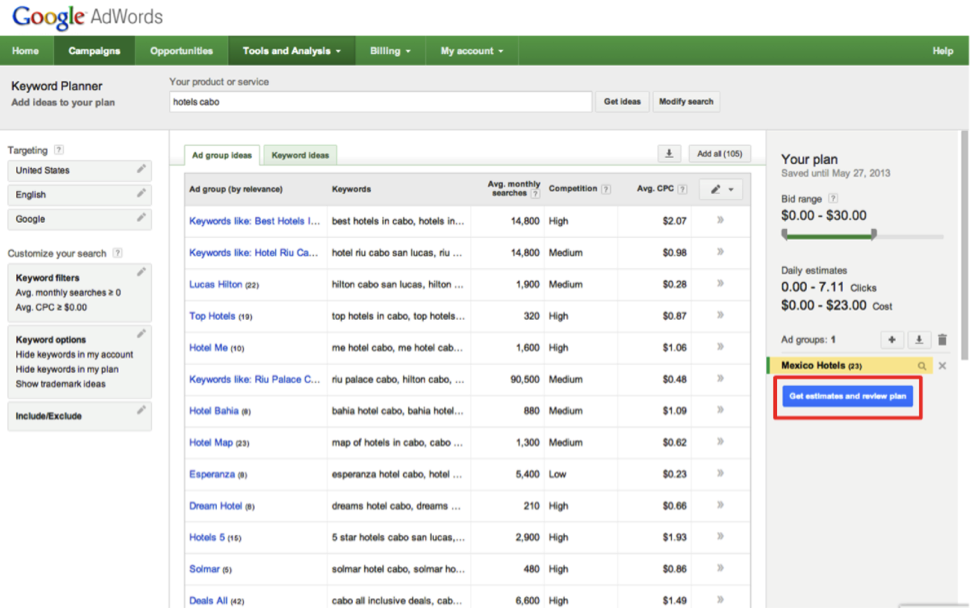Ask Yourself These 9 Questions before Launching Your SEO Plan Into Action
Starting an SEO campaign for your small business is no easy feat; there’s a lot that goes into SEO success, and it won’t happen overnight. However, top SEO rankings are imperative for a successful business, and so it’s worth it to put some time and effort into developing a successful plan. Review the following 9 questions before launching your SEO plan into action.
Do you have clear goals and objectives?
One of the first things you should do when creating an SEO plan is come up with some clear goals and objectives to keep you focused throughout the process. Determine what you want to accomplish through SEO and then create your goals accordingly. Consider at what level you’re currently performing, how you’d like to improve, and how you plan on achieving your goals. It’s ok to set high standards for yourself, but make sure they’re attainable as well. It’s also not a bad idea to create goals in the form of benchmarks; that way, instead of waiting a long time to achieve success you have smaller standards to work towards throughout. You can learn more about setting SEO benchmarks here.
Who is your target audience?
In order to create goals you’ll need to know who your target audience is that you’re trying to reach. Once you know who they are, figure out what they want. What are they looking for in a website and/or product, and how can you provide that to them? Center your SEO strategy around the answers to those questions and you can’t lose.
Are you familiar with the competition?
If you think that you don’t need to know who your competition is and what they’re doing in order to succeed at SEO, think again. Not only can you learn from the successes and failures of your competition, you need to know where they’re at and where you stand accordingly so that you can make sure your business comes out on top. Is your site consistently falling behind the competition when it comes to SEO? Do some research and figure out why. Is their site more mobile-friendly than yours? Are their keywords more relevant? Are they more active on social media? Get to the bottom of the problem, learn from your mistakes, and get ahead of the game (and the competition).
Have you incorporated social media?
In order to truly be successful with SEO, you need to make sure you’ve incorporated social media into your strategy. Social media makes it easy to attract and engage customers, and the more consistent traffic you have towards your site the better your rankings will be. Social media is a great place to share your optimized content, to increase brand awareness, to connect with potential customers, and to reward loyal ones. So if you’re not on Facebook/LinkedIn/Twitter/Instagram, etc. you’re missing out! Even if you can’t afford ads right away, having a presence is extremely important for visibility, and in this day and age, legitimacy and reputability. Get on social and get results.
Have you done sufficient keyword research?
Choosing the right keywords and making sure they’re optimized is one of the most important things you can do for your SEO strategy. You want to try to determine what keyword(s) consumers are going to type into search engines and then make sure to use those keywords throughout your content in order to achieve the best possible rankings. While you will probably still rank without putting a lot of thought into keyword research, you’ll be missing out on a huge margin for success that a well thought out keyword strategy could provide for your business. Consider reading this article by the Content Marketing Institute on exactly how to optimize keywords to gain maximum potential.
Is your content valuable and optimized?
Once you’ve got your keywords squared away, you’ll want to make sure your website’s content is both optimized and valuable for your consumers. One way to make sure it’s optimized is by doing the keyword research suggested above. Google AdWords has a free keyword tool that can help with this as well. I’m putting a big emphasis on keywords because it’s much easier to write valuable content when you have keywords in mind than if you didn’t and tried to fit them in after the fact. Secondly, just make sure what you’re writing is valuable and relevant for consumers and you’re not just creating fluff with keywords strewn about. There’s no point in directing customers towards your blog if they’re just going to be disappointed when they get there. In addition to the AdWords tool, WordPress also offers the SEO Yoast Tool that tells you how well your content is optimized for SEO.
Is your website mobile friendly?
There is absolutely no point in going to all this trouble to drive visitors to your site if once they get there the website won’t load on their phone, tablet, or other device. In 2016, 80% of users own smartphones and tablet devices account for the highest add-to-cart rates on e-commerce websites at 8.58%, so if your site isn’t optimized for mobile you’re definitely missing out on sales. Even better, Google has now announced that they will be mobile indexing first, so you can’t ignore mobile any longer.
Are your metatags and web pages coded correctly?
Metatags create the display text that users see when your site shows up in search engine results. This is important because if your tags are relevant and coded correctly they could dramatically increase the click through rates to your website. The same thing goes for the individual pages on your website; they need to be coded relevantly so that they show up on the appropriate results pages on search engines, thus driving traffic to your site and increasing your SEO rankings.
Do you know how to use Google Analytics?
Last but not least, you’ll need to download Google Analytics and familiarize yourself with how to use it. It’s a free and easy program that will help you track your SEO progress; an important step so you know if your campaign is successful or not. You can reach out to us for Google Analytics Marketing with any questions.
Can you think of any other important questions that should be asked before launching an SEO plan? Comment in the section below!
Feature Image Credit: Google.com/Analytics











